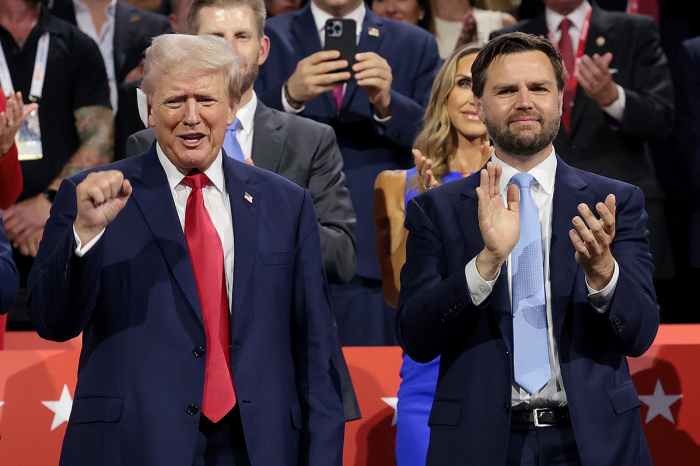Is Trump the candidate who best represents a Christian worldview? 'Politics in the Pews' podcast explores

Get your tickets today to Politics in the Pews with speakers Sam Brownback and Ralph Reed, among others, at Fellowship Church in Grapevine, Texas, on Aug. 27. Learn more here: politicsinthepews.com
Is Donald Trump the candidate who best represents the Christian worldview?
That’s the question at the heart of the first episode of CP's “Politics in the Pews” podcast, titled “Trump Conviction, Political Chaos Spark Historic Election Cycle.” In it, host and Christian Post reporter Ian Giatti asks Evangelical leaders, including Wayne Grudem, Ralph Reed, Samuel Rodriguez, Jason Yates and others about their insights on the 78-year-old Republican presidential nominee.
Listen to each episode of the "Politics in the Pews" podcast here
Giatti first outlined how, earlier this year, Trump became the first ex-president to be convicted of a felony: in May 2024, a New York jury found Trump guilty on 34 counts of falsifying business records.
"This is a scam. There's a rigged trial. The only way they think they can win this election is by doing exactly what they're doing right now. Win it in the courts because they can't win it at the ballot box," Trump said at the time.
But surprisingly, the conviction galvanized Trump's support base; within 24 hours of the verdict, his campaign raised a record $53 million. Trump's strategic move to join TikTok, a platform he once sought to ban, also resulted in over 4 million followers in just two days, far surpassing President Joe Biden's campaign account.
Despite this surge in popularity, Giatti noted that the political ramifications of Trump's conviction were nevertheless complex.
Wayne Grudem, a prominent conservative commentator, has long voiced concerns about Trump's candidacy. "If Trump stays in the race and wins the Republican nomination, he is very likely to lose the general election. That would be a disaster for the Republican Party and for the nation," Grudem wrote in a Newsweek op-ed.
Trump's support among white Evangelical Christians has grown. Entrance polling from recent caucuses shows that 55% of respondents identified as white Evangelicals, and 53% of them voted for Trump. The results marked a significant increase from 2016, when only 21% of white Evangelicals supported him.
Ralph Reed, founder of the Faith and Freedom Coalition, highlighted the dilemma faced by Evangelical voters. He stressed that Christian voters are being asked to choose between two flawed candidates with polar opposite views on the topic of abortion, a key issue among Evangelicals.
Though Trump is not the “greatest role model,” Reed said he’s the choice for those who “believe that the taking of life in the womb is a moral issue ... and abortion on demand is the gravest national evil of our time.”
While Trump enjoys substantial support among Evangelical voters, he has also faced criticism from within the community.
Gabriel Salguero, head of the National Latino Evangelical Coalition, urges Hispanic voters to remain independent: "Blind allegiance to any political party actually hurts us from moving policy that is Gospel-centered and biblically based forward."
Salguero's concerns are echoed by others who feel that Trump's rhetoric on illegal immigration and other issues is harmful.
However, Samuel Rodriguez, president of the National Hispanic Christian Leadership Conference, said Trump's policies have delivered tangible benefits. He urges voters to "put the tweets aside" and focus on the "remarkable return on investment" from Trump's presidency.
Giatti contended that the debate within the Evangelical community is not just about policies but also about the role of Christian values in politics.
Denise Gibson, a pro-life advocate, expressed disappointment over the politicization of the Church and lamented the failure of Christians to hold Trump and other candidates accountable for compromising on not just abortion, but other key issues among Evangelicals.
"Why are we taking this lying down from our own candidate that we have supported so strongly?" she asked. “When have we, as a Church, decided that we are going to stand with the politicians instead of with truth? And that's what breaks my heart more than anything.”
Jason Yates of My Faith Votes casted doubt on the likelihood of another record-breaking Evangelical turnout for Trump in 2024. "There are many who love Trump and many who hate Trump, and even in Christian circles," he said.
Conversely, author and commentator Craig Huey predicted a massive Evangelical turnout, with the majority casting their ballots for Trump. Reflecting on the 2020 election, Huey noted a lack of engagement and mobilization among pastors and Evangelical volunteers and said he believes 2024 will be different.
"I think that the Church will be mobilized. Many may not like Donald Trump for a variety of reasons ... you’re going to find as high as 84% of the Evangelicals will vote," Huey asserted.
Giatti encouraged Christians to “get out and vote,” adding: “Regardless of where the Church may fall on things Trump, that's one message we can all get behind.”




























